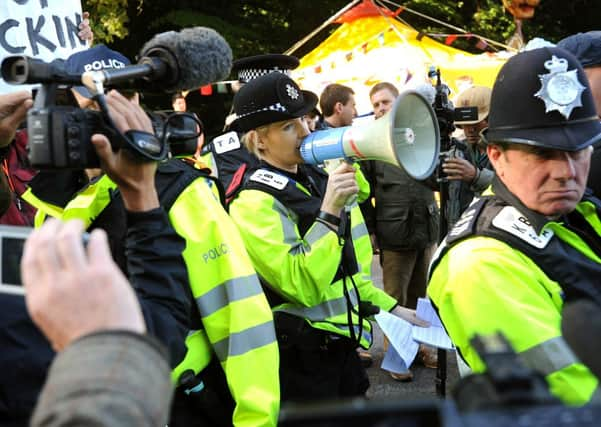Chief constable questioned over ‘weak’ Balcombe protest policing


Katy Bourne, the Sussex police and crime commissioner (PCC), questioned Martin Richards during a performance and accountability this afternoon (Friday September 20).
They discussed three issues regarding the policing of anti-fracking protests outside energy firm Cuadrilla’s site in London Road - the effectiveness of policing response, the management of resources and the cost of policing.
Advertisement
Hide AdAdvertisement
Hide AdThe chief constable revealed there have been a total of 106 arrests at the site since campaigning began this summer.
Of those arrested, 74 have been charged, 11 cautioned, four bailed and one person banned from the area.
No further action has been taken against 16 people.
Mrs Bourne questioned Mr Richards over the public confidence in Sussex Police.
She focused on Cuadrilla’s decision to scale back operations in August and a headline published in a national newspaper which read ‘police cave in to mob rule’.
Advertisement
Hide AdAdvertisement
Hide AdThe chief constable explained the actions his officers have taken to remove protesters.
Mrs Bourne asked: “Do you think that knocks confidence because you’re being seen as weak or soft?”
To which Mr Richards replied: “I don’t see what’s being soft in that.
“I don’t want us to be tougher than we have to be. We have to be reasonable and proportionate in all that we do.”
Advertisement
Hide AdAdvertisement
Hide AdThe PCC questioned Mr Richards over why no senior police officer was sent to the protests until after she visited on day three.
“I did go down on day three because it was apparent to me that no member of the senior team had visited the site,” she explained during the meeting which was broadcast live on the web.
“That was a concern I would like to raise, it’s a piece of learning to take away.”
The chief constable said: “It’s a pity that wasn’t raised at the time because that’s the first I’ve heard of it.
Advertisement
Hide AdAdvertisement
Hide AdLater on he admitted: “On occasion we have been slow to react, perhaps we could have done that a little bit quicker.”
Mr Richards said Sussex Police did not advise Cuadrilla to stop drilling before the No Dash for Gas camp descended upon the village in August.
But he told the firm he could not guarantee the site’s security.
He explained: “We met with Cuadrilla before the climate camp and before the mood changed and shared our assessment with them of what to expect.
Advertisement
Hide AdAdvertisement
Hide Ad“We couldn’t give an absolute guarantee that there wouldn’t be an incursion on to their drilling site. The decision to scale back was taken by Cuadrilla and nobody else.”
Mrs Bourne also questioned the chief constable over the use of force by officers when making arrests.
In particular she asked about the pressure point tactic.
“It does hurt, it doesn’t cause injury,” said Mr Richards.
“It’s a disabling technique which allows us to move the person from an unlawful place to a lawful place.”
Mrs Bourne said waves of ‘snatch squads’ where numerous protesters were arrested at one time had ‘inflated the atmosphere negatively’.
Advertisement
Hide AdAdvertisement
Hide AdThe chief constable said this was a ‘consequence of careful planning’.
The forecasted cost of the entire operation will total more than £4million.
It is ranked as major incident by Sussex Police - one that has the potential to affect the reputation of the force, Mr Richards explained.
He went on to say that there have been 1,400 fewer crimes reported compared to July and August last year.